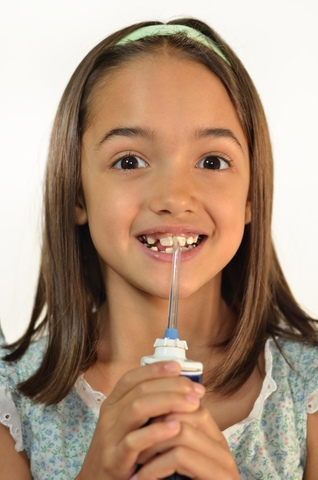April 5th, 2023

Your bright smile means you’re happy, and it’s catching! Sharing your smile makes the people around you happy, too! And you can make sure your smile is as bright as it can be by keeping your teeth their cleanest.
Nobody wants food stuck in between their teeth, but cleaning your teeth doesn’t just mean brushing away any leftover bits of food. It also means brushing away the sticky plaque that builds up on your teeth every day. Germs in plaque called bacteria help make cavities, so it’s extra important to brush and floss away all the plaque you can.
When you were younger, a grown-up cleaned your teeth for you. Now that you’re ready to begin brushing and flossing on your own (with some adult help, of course), here are some good habits to start you off right.
Brush the Right Way
- Brush a tooth or two at a time with small brushstrokes and circles. Long back-and-forth brushstrokes miss a lot of plaque. Make sure you brush all the different sides of your teeth, not just the ones which show when you smile. Brush on the inside of your teeth and the tops of your molars (those big teeth in back). Use up-and-down strokes to clean behind your front teeth.
- Tip your toothbrush toward your gums while you brush along the gum line to get the plaque that likes to hide there.
- Don’t scrub your teeth. The tooth enamel that covers and protects our teeth is very strong, but brushing too hard can hurt it. Gentle brushing works!
- And don’t forget to gently brush your tongue for fresh breath.
Take Your Time
- You can’t keep your teeth their cleanest if you don’t spend enough time brushing them! That’s why dentists say it’s best to brush at least twice each day, for two minutes each time you brush.
- It’s hard to guess how long two minutes is, so use a little timer to keep track of the time. If you like music, play a song that lasts two minutes. Or ask a grown-up to time you—and maybe even brush with you!
Use the Right Toothbrush
- You want a brush that is just the right shape and size. A brush which is too big is hard to use—and hard to fit inside your mouth.
- You want a brush with soft bristles. Medium and hard bristles are too hard, and can scrape your enamel and gums. Stay with soft bristles, and your teeth and gums will be healthy and happy.
- Toothbrushes don’t last a very long time because their bristles start to break down after a while. After all, it’s hard work cleaning teeth twice a day every day! So it’s a good idea to change your toothbrush every three or four months, or whenever the bristles start to look a bit scruffy.
Use the Right Toothpaste
- Fluoride toothpaste helps protect your teeth from cavities and makes your enamel even stronger than it already is. There are plenty of fun-flavored fluoride (say that three times fast!) toothpastes to choose from.
- You don’t need too much. Once you’re brushing on your own, a small dab about the size of a pea will do the trick.
- Be sure to spit out the toothpaste after brushing. It’s for cleaning, not swallowing!
Don’t Forget to Floss
- Once you have any teeth that touch each other, you need to floss between them at least once a day. Flossing is the best way to get rid of the plaque that hides between your teeth where your brush just can’t reach.
- Flossing can be a little tricky at first, so you might need some help until you’re able to floss on your own. Dr. Irwin Seidman can teach you the best way to floss, and a grown-up at home can help you until you’re ready to floss by yourself.
- There are lots of different kinds of floss. If you’re having trouble flossing, ask our Palatine, IL dental team which kind is best for you.
Every smile is different, and yours is one of a kind. If you have any questions, talk to your pediatric dentist. Dentists don’t just take care of your teeth—they teach you to take care of your teeth, too! Your dentist can show you the very best way to keep your very own smile as bright and healthy as it can be.
April 5th, 2023

One of the most frequent questions that Dr. Irwin Seidman and our team hear is about what kinds of snacks are best for a child’s dental health. Sugary snacks are inevitable sometimes, but it’s vital for you as a parent to monitor how frequently your child is eating the kinds of snacks that may give him or her a cavity or two down the line.
Unsurprisingly, the best snacks are healthy ones, though they may not always be the most appealing to your little ones. The good news is that healthy doesn’t mean you have to compromise on taste. Once your kids give these tasty snacks a go, they might become open to all things healthy!
- Fresh veggies and hummus
- Apple wedges with peanut butter
- Low-fat yogurt with berries
- Cubes of cheese and crackers
- Hard-boiled eggs with a little bit of salt and pepper
- Celery sticks with cream cheese and sunflower seeds
- A homemade milkshake with low-fat milk (or almond milk), the fruit of their choice, chia seeds, and cinnamon
- Lean proteins such as chicken breast, fish, and turkey
These snacks aren’t high in sugar but they contain all the nutrients your children need to have the necessary energy throughout the day.
This is only a sample of all the great, healthy snacks out there for your kids. For more ideas, ask us the next time you visit our Palatine, IL office. It’s never too early to create healthy habits; they’re not only good for oral health, but overall health too. That’s a win-win, if you ask us.
March 29th, 2023

Every moment of your baby’s first year of life is precious, since every day your child grows a little, develops new skills, and discovers new things. Most of it is wonderful, but parents don’t like to see their babies in pain. That’s why teething can be such a hard experience. However, you can take steps to make it easier for you and your baby.
What to Expect
Most babies begin teething around the age of six months, when the lower central incisors start to appear. Shortly after this time, the upper central incisors poke through, followed by the lateral incisors, first molars, canines, and second molars. Unfortunately, you’ll probably know that your baby is teething not because you see these teeth come in, but because your baby will be in discomfort. These are some of the signs to watch for when you’re expecting your baby to begin teething.
- Tender and sore gums
- More drooling than before
- Being crankier than usual
- Chewing on hard objects
What You Can Do
As a parent, you want to do everything you can to make your child more comfortable. These are some approaches that Dr. Irwin Seidman and our team recommend:
- Take a clean moistened wash cloth or use your own washed finger to rub your baby’s gums and provide relief due to the pressure.
- Provide a firm rubber teething ring for your baby to use, but don't use the type that is filled with liquid.
- Use a bottle. A bottle filled with cold water can be soothing. Don’t give your baby formula, milk, or juice constantly because the sugar can cause tooth decay.
- Medications can help for extreme crankiness. Infant Tylenol is an example, but it’s best to check with your pediatrician before giving your baby medications.
You might also want to take special care to dry the drool. It’s not just to keep yourself and your baby dry. Keeping your baby’s skin dry can help prevent irritation.
When to Visit Us
Once your child’s first tooth comes in, it’s time to start thinking your baby’s first trip to our Palatine, IL office. The American Dental Association suggests that you bring your child to the dentist within six months of the appearance of the first tooth, or at about one year of age. Dr. Irwin Seidman can do a quick check for tooth decay, and we’ll make sure you know how to take care of your child’s new teeth.
March 29th, 2023

Water picks, sometimes called “oral irrigators,” make an excellent addition to your regular home care regimen of brushing and flossing. Especially helpful to those who suffer from periodontal disease and those patients of ours undergoing orthodontic treatment with full-bracketed braces, water picks use powerful tiny bursts of water to dislodge food scraps, bacteria, and other debris nestled in the crevices of your mouth. Children undergoing orthodontic treatment may find using a water pick is beneficial if their toothbrush bristles tend to get caught on their wires or brackets.
When you use a water pick, you’re not only dislodging any particles or debris and bacteria you might have missed when brushing, you are also gently massaging the gums, which helps promote blood flow in the gums and keeps them healthy. While water picks are an excellent addition to your daily fight against gingivitis and other periodontal diseases, they are incapable of fully removing plaque, which is why Dr. Irwin Seidman and our team at Palatine Pediatric Dentistry want to remind you to keep brushing and flossing every day.
If you have sensitive teeth or gums and find it uncomfortable to floss daily, water picks are a good alternative to reduce discomfort while effectively cleaning between teeth. Diabetics sometimes prefer water picks to flossing because they don't cause bleeding of the gums, which can be a problem with floss. If you have a permanent bridge, crowns, or other dental restoration, you may find that a water pick helps you keep the area around the restorations clean.
So how do you choose the right water pick?
Water picks are available for home or portable use. The home versions tend to be larger and use standard electrical outlets, while portable models use batteries. Aside from the size difference, they work in the same manner, both using pulsating water streams. A more crucial difference between water picks is the ability to adjust the pressure. Most home models will let you choose from several pressure settings, depending on how sensitive your teeth and gums are. Most portable models have only one pressure setting. If you want to use mouthwash or a dental rinse in your water pick, check the label first; some models suggest using water only.
Please give us a call at our Palatine, IL office if you have any questions about water picks, or ask Dr. Irwin Seidman during your next visit!






 Website Powered by Sesame 24-7™
Website Powered by Sesame 24-7™